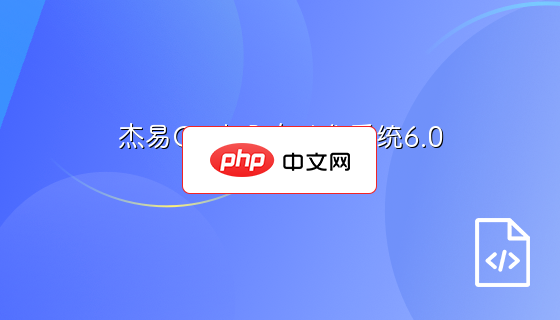答案:C++中推荐使用RAII而非try-catch-finally管理资源,因其通过构造函数获取资源、析构函数释放资源,确保异常发生时资源仍能自动释放,避免泄漏;标准库如std::unique_ptr和std::lock_guard是典型应用,自定义RAII类需禁拷贝、允移动,并在析构函数中安全释放资源;异常处理应抛对象、捕获引用,不从析构函数抛异常,慎用catch(...),并优先用noexcept优化性能。

在C++中,将异常处理与资源释放结合使用,核心思想在于确保即使程序执行过程中发生不可预见的错误(异常),已获取的资源也能被安全、及时地释放,避免内存泄漏、文件句柄未关闭、锁未释放等问题。这主要通过“资源获取即初始化”(RAII)这一C++特有的范式来实现,它将资源的生命周期与对象的生命周期绑定,利用析构函数的自动调用机制来保证资源释放。
在C++中,实现异常安全和资源释放的黄金法则就是RAII(Resource Acquisition Is Initialization)。简单来说,就是将资源的获取(如打开文件、分配内存、获取锁)放在对象的构造函数中,而将资源的释放操作放在对象的析构函数中。这样,无论函数是正常返回,还是因为抛出异常而提前退出,对象的析构函数都会被自动调用,从而确保资源得到清理。这比手动在
try-catch块中管理资源要优雅和安全得多。
为什么在C++中推荐使用RAII而非传统的try-catch-finally进行资源管理?
我个人认为,RAII在C++中的地位几乎是不可撼动的,它不仅仅是一种编程习惯,更是一种设计哲学,深刻影响着C++代码的健壮性和可维护性。传统的
try-catch-finally模式(在C++中,我们通常用
try-catch配合析构函数或手动清理来模拟
finally,但其本质与Java或Python的
finally块有所不同)虽然也能实现资源清理,但它存在一些固有的缺陷,使得RAII成为更优的选择。
首先,
try-catch-finally模式要求开发者显式地在
finally块中编写资源释放代码。这意味着每当获取一个资源,就需要在多个地方(正常路径和异常路径)考虑其释放问题。这无疑增加了代码的冗余和出错的可能性。想象一下,一个函数中获取了多个资源,一旦顺序或逻辑稍微复杂一点,手动管理这些资源的释放就很容易遗漏,导致资源泄漏。而RAII则将这一复杂的管理逻辑封装在类型内部,开发者只需创建对象,无需关心何时释放,编译器会替你完成。
立即学习“C++免费学习笔记(深入)”;
其次,RAII天然地提供了异常安全保证。当异常被抛出时,栈上的局部对象会按照构造顺序的逆序自动销毁,它们的析构函数会被调用。这意味着,即使在函数执行过程中某个点抛出了异常,所有已成功构造的RAII对象的析构函数依然会被执行,从而安全地释放其持有的资源。这种“自动性”是其最强大的优势之一,它将资源管理从业务逻辑中解耦,让开发者能更专注于核心功能的实现。
例如,
std::unique_ptr和
std::shared_ptr就是RAII的典范,它们管理着动态分配的内存。
std::lock_guard和
std::unique_lock则用于管理互斥锁。当你创建一个
std::lock_guard对象时,它会在构造函数中锁定互斥量,并在析构函数中自动解锁,完美地解决了多线程编程中锁忘记释放的常见问题。这种机制大大降低了心智负担,提升了代码的清晰度和正确性。
如何自定义RAII封装器以管理非标准资源?
当然,标准库提供的RAII类型已经覆盖了许多常见场景,但实际开发中我们总会遇到需要管理非标准资源的情况,比如自定义的文件句柄、网络连接、数据库事务等。这时,我们就需要自己动手编写RAII封装器。这并不复杂,关键在于理解其核心思想并正确实现构造函数和析构函数。

基于Intranet/Internet 的Web下的办公自动化系统,采用了当今最先进的PHP技术,是综合大量用户的需求,经过充分的用户论证的基础上开发出来的,独特的即时信息、短信、电子邮件系统、完善的工作流、数据库安全备份等功能使得信息在企业内部传递效率极大提高,信息传递过程中耗费降到最低。办公人员得以从繁杂的日常办公事务处理中解放出来,参与更多的富于思考性和创造性的工作。系统力求突出体系结构简明
以下是一个简单的自定义文件句柄RAII封装器的例子:
#include// For FILE*, fopen, fclose, perror #include #include // For std::runtime_error // 自定义文件句柄RAII封装器 class FileHandle { public: // 构造函数:获取资源 explicit FileHandle(const std::string& filename, const std::string& mode) { file_ptr_ = std::fopen(filename.c_str(), mode.c_str()); if (!file_ptr_) { // 资源获取失败,抛出异常 std::string error_msg = "Failed to open file: " + filename; perror(error_msg.c_str()); // 打印系统错误信息 throw std::runtime_error(error_msg); } // std::cout << "File '" << filename << "' opened successfully." << std::endl; } // 析构函数:释放资源 ~FileHandle() { if (file_ptr_) { std::fclose(file_ptr_); file_ptr_ = nullptr; // 避免双重释放 // std::cout << "File handle closed." << std::endl; } } // 禁止拷贝构造和拷贝赋值,因为文件句柄通常是独占的 FileHandle(const FileHandle&) = delete; FileHandle& operator=(const FileHandle&) = delete; // 允许移动构造和移动赋值 FileHandle(FileHandle&& other) noexcept : file_ptr_(other.file_ptr_) { other.file_ptr_ = nullptr; // 源对象不再拥有资源 } FileHandle& operator=(FileHandle&& other) noexcept { if (this != &other) { if (file_ptr_) { std::fclose(file_ptr_); // 释放当前资源 } file_ptr_ = other.file_ptr_; other.file_ptr_ = nullptr; } return *this; } // 提供访问底层资源的方法 FILE* get() const { return file_ptr_; } // 其他文件操作方法可以添加在这里 // ... private: FILE* file_ptr_; }; // 示例用法 void process_file(const std::string& path) { try { // 创建FileHandle对象,构造函数会尝试打开文件 FileHandle my_file(path, "r"); // 如果文件打开成功,可以在这里进行文件操作 char buffer[256]; if (std::fgets(buffer, sizeof(buffer), my_file.get()) != nullptr) { // std::cout << "Read from file: " << buffer << std::endl; } else { // std::cout << "Could not read from file or file is empty." << std::endl; } // 假设这里发生了另一个错误,抛出异常 // throw std::runtime_error("Simulated error during file processing."); // 函数正常结束,my_file的析构函数会被调用,自动关闭文件 } catch (const std::runtime_error& e) { // 捕获异常,my_file的析构函数在捕获前已经自动调用 // std::cerr << "Error in process_file: " << e.what() << std::endl; // 可以选择重新抛出异常,或者进行其他错误处理 throw; } } // int main() { // // 假设文件 "test.txt" 存在 // process_file("test.txt"); // // 假设文件 "non_existent.txt" 不存在 // // process_file("non_existent.txt"); // return 0; // }
在这个例子中,
FileHandle类的构造函数负责调用
fopen打开文件,如果失败则抛出
std::runtime_error。析构函数则负责调用
fclose关闭文件。无论
process_file函数是正常执行完毕,还是在文件操作过程中(比如读取时)抛出异常,
my_file对象的析构函数都会被调用,确保文件句柄被正确关闭。此外,我还加入了移动语义的实现,这对于资源管理类来说非常重要,它允许资源所有权的转移,而不是进行昂贵的深拷贝或干脆禁止传递。禁止拷贝构造和拷贝赋值是出于对独占资源的考虑,这通常是RAII封装器的常见模式。
C++异常处理的最佳实践与陷阱有哪些?
在C++中,异常处理是一把双刃剑,用得好能极大提升程序的健壮性,用得不好则可能引入新的复杂性和问题。
最佳实践:
-
为“异常”而生,而非流程控制: 异常应该用于处理那些程序无法在当前上下文继续正常执行的、不常见或不可预期的错误情况。例如,文件打不开、内存分配失败、网络连接中断等。不要用异常来替代
if/else
进行常规的业务逻辑判断或流程控制,这会使得代码难以阅读和维护,并可能带来性能开销。 - 利用RAII保证异常安全: 这是我反复强调的核心。将所有资源管理都封装在RAII对象中,确保无论发生什么,资源都能被正确释放。这是实现“强异常安全保证”(要么操作成功,要么状态不变)的基础。
-
抛出对象,捕获引用: 总是
throw
一个异常对象(通常是std::exception
的派生类或自定义类型),并以const
引用方式catch
它。例如:throw MyError("Something went wrong.");和catch (const MyError& e) { ... }。这避免了对象切片和不必要的拷贝。 -
构建清晰的异常层次结构: 继承
std::exception
并创建自己的异常类层次结构,可以使异常处理更加精细化。这样,你可以在不同的catch
块中处理不同类型的错误,或者在更上层捕获基类异常来处理所有错误。 -
按特定性捕获: 捕获异常时,应该从最具体的异常类型开始,逐步到最通用的异常类型。例如,先
catch (const MySpecificError&)
,再catch (const std::runtime_error&)
,最后catch (const std::exception&)
。最通用的catch (...)
应该慎用,它会捕获所有类型的异常,包括C++标准库之外的异常,但你无法知道捕获到了什么,通常只用于最后的错误日志记录或程序终止。 -
析构函数中不抛出异常: 这是C++的一个重要规则。如果一个析构函数在另一个异常活跃时抛出异常,程序会立即终止(
std::terminate
),导致未定义行为。因此,析构函数应该被设计为永不抛出异常。如果析构函数内部的操作可能失败,应该在内部处理这些失败,而不是向外抛出。 -
使用
noexcept
: 对于那些保证不会抛出异常的函数,使用noexcept
关键字进行标记。这不仅是向编译器和调用者提供承诺,也允许编译器进行某些优化。特别是移动构造函数和移动赋值运算符,如果它们是noexcept
,在某些STL容器操作(如std::vector
的push_back
)中可以获得性能优势。
陷阱:
-
过度使用
catch (...)
: 盲目地使用catch (...)
捕获所有异常,而不进行适当的日志记录或重新抛出,可能掩盖真正的错误,导致程序行为异常且难以调试。它通常只在最顶层用于捕获并记录所有未处理的异常,然后安全地终止程序。 - 忘记RAII: 即使对异常处理机制很熟悉,如果未能坚持使用RAII,仍然会遇到资源泄漏问题。这是最常见的陷阱之一。
-
异常规范(
throw()
)的误用或过时: C++11及更高版本中,动态异常规范(如void func() throw(std::bad_alloc)
)已被弃用,并在C++17中移除。现在推荐使用noexcept
。 -
在
catch
块中不重新抛出异常: 如果一个函数捕获了异常,但没有能力完全处理它(即无法恢复到一致状态),那么它应该重新抛出异常(throw;
)让上层调用者处理,而不是默默吞噬异常,这同样会掩盖问题。 -
性能考量: 异常处理机制通常比简单的错误码返回要慢。在性能敏感的代码路径中,如果错误是预期且可频繁发生的,那么使用错误码或
std::optional
等方式可能更合适。异常应该保留给真正的“异常”情况。 - 在构造函数中处理异常失败: 如果构造函数中资源获取失败并抛出异常,要注意确保已经成功构造的子对象或成员变量的析构函数会被调用。C++标准保证,在构造函数抛出异常时,已经成功构造的子对象会被正确销毁。但如果资源是在构造函数体内部手动分配的,且没有RAII封装,那么在抛出异常前需要手动清理。
总的来说,C++的异常处理与资源释放是一个紧密相连的话题,RAII是其核心,它提供了一种优雅而强大的机制来确保程序的健壮性。理解并实践这些原则,可以帮助我们编写出更可靠、更易于维护的C++代码。





























